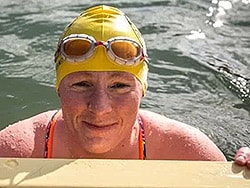Adam Boggon, MBChB, was doing work at the Royal Free Healthcare facility in North London during the city’s 2nd wave of COVID-19. “I was proficiently dwelling in the healthcare facility,” he recollects. “It felt like I was likely 10,000 miles per hour, trying to corral hundreds of health care students and doctors.”
Adam Boggon, MBChB
During a nationwide lockdown, there were being number of places Boggon could escape to, but the Hampstead Heath swimming ponds mostly remained open. He swam there on a regular basis to exercising and recharge even in wintertime.
“Swimming in chilly drinking water usually takes you out of oneself,” Boggon states. “It was such a release for anyone who grew up in a rural location and had access to inexperienced room, even even though the drinking water is murky.” It also hovers close to 50 °F (10 °C).
Leaping into chilly drinking water, properly, variety of stinks. So why do it? It truly is not only for bragging rights. A increasing amount of reports suggest sizeable mental and actual physical overall health benefits to swimming in cold h2o, exclusively to boost depression signs or symptoms and even ease inflammatory problems.
And a large amount of that research is driven by health-related professionals who appreciate to do it them selves.
For Boggon, swimming in frigid water is not comfortable, but he feels that a feeling of calmness follows that tends to make the plunge more than worthy of it. Now a Fulbright Scholar at Harvard, exactly where he experiments public wellness and wellbeing management, Boggon is equipped to frequent the fabled Walden Pond just exterior of Boston, Massachusetts.
As Thoreau himself mentioned, “You can under no circumstances have sufficient of character.”
Indeed, even if it really is seriously, genuinely cold.
Taking a Deeper Dive
Heather Massey, PhD, a senior lecturer in Sport, Wellbeing and Physical exercise Science at College of Portsmouth blames her father, a dinghy sailor, for her affinity for cold-water swimming.

Heather Massey, PhD
And she’s accomplished more than most, together with an epic 16-hour crossing of the English Channel. The h2o temperature was in the higher-50s °F, and she swam with out a wetsuit. “Time just seemed to collapse,” she has shared about the expertise.
While working on her PhD and finding out the results of environmental physiology, in unique what takes place to the body when it receives scorching or cold, Massey’s hobby and scientific studies appeared to coalesce.
Massey’s investigate originally targeted on the hazards all over staying in cold open drinking water. But she also noticed a expanding development of men and women boasting wellness gains from the practice. “Men and women commenced to discuss about enduring improved indicators of depression or improved psychological health from their actions in the drinking water,” she suggests.
She partnered with a further outside swimming enthusiast, Hannah Denton, a counseling psychologist performing for the Countrywide Health and fitness Company in the United Kingdom. Denton was publishing papers on the prospective influence that out of doors swimming may well have on persons with depression and how it could strengthen mental wellness in basic. She also often engages in chilly-water swims to strengthen inner thoughts of mindfulness and peace.
“Getting the encounter of being so close to mother nature, as nicely as the strong sensory working experience of being in chilly h2o, does really really encourage you to be in the moment,” Denton wrote in an write-up for the Sussex Mindfulness Centre. “My ordeals of sea swimming and mindfulness guidance just about every other. Each have designed me come to feel additional snug with my overall body, to have additional of a current second aim, to fork out attention to my respiration and to achieve distance from complicated thoughts.”
About the earlier number of years, Massey and Denton have moved from fairly tiny-scale experiments with no genuine controls to currently, finishing a randomized managed trial and seeking at the impression that outside swimming may have on folks living with mild to average depression.
“At initially, people today form of assumed our notion was a little bit wacky,” states Massey. “Now, the recognition of open-h2o swimming has definitely blossomed, and so has this region of exploration. We’re starting to make additional rigor into the perform.”
Like all the scientists and physicians interviewed for this write-up, Massey hesitates to claim that chilly-water swimming is a “treatment” that should be medicalized.
“It is not about prescribing it or forcing folks to do it,” suggests Massey. “This is not a little something that a medical doctor must produce on a prescription and say you ought to go and have eight 1-hour classes of swimming.”
(Not However) a Prevalent Remedy
Enter into the dialogue Mark Harper, MD, PhD, specialist anesthetist at Sussex University Hospitals in the United Kingdom and Kristiansand, Norway. Harper is the author of the 2022 e book, Chill: The Chilly Drinking water Swim Remedy – A Transformative Information to Renew Your Body and Mind.

Mark Harper, MD, PhD
Harper grew up swimming in swimming pools, and it was not till his pool closed for 2 months that he ventured into the sea. He recalls going for walks up the seashore afterward, imagining, God, this feels great, and from that instant on, he turned hooked on out of doors swimming and curious about its therapeutic opportunity.
The “cure” in the book’s title, Harper explains, is currently being applied in the historic perception of “cure,” as in the first professional medical book about sea-bathing prepared around 250 yrs back. Harper acknowledges that the relationship to overall health is however speculative. “However, the circumstantial proof, the opinions from individuals and early analyze data for its benefits are now quite sturdy,” he states.
In a smaller review revealed in 2022, Harper and colleagues took 59 folks with anxiety and depression and set them through a sea-swimming course. Afterward, 80% showed a clinically significant improvement in their mental health and fitness.
Much more a short while ago, Harper and his group of researchers unveiled a survey to establish how many people today have been utilizing cold-drinking water swimming as a remedy for a mental or bodily ailment. “We assumed 30 or 40 folks would reply, but we finished up with in excess of 700,” says Harper. “The the greater part had been using it for psychological wellness but also provided inflammation-relevant conditions.”
More than two many years, Harper has witnessed remarkable success tales. In his book, he remembers a great close friend who, in his early 20s, suffered from Crohn’s illness so badly he could not walk up the methods to his parents’ home. The pal turned to out of doors cold swimming as a reduced-influence training and began noticing the symptoms of his ailment have been increasing. In months, he was able to go off his remedies. In 2022, he concluded 52 triathlons: a person for each 7 days for the complete year.
How Cold Exposure Could Play With Your Brain
Vaibhav Diwadkar, PhD, professor of psychiatry and behavioral neurosciences at Wayne Point out University School of Drugs, in Michigan, is studying how human brain networks respond to chilly publicity. Diwadkar and his colleague, Professor Otto Muzik, PhD, started by placing volunteers in a rubber go well with with thin tubing and infusing the tubing with temperature-controlled water. Meanwhile, they gathered practical brain imaging knowledge to review which sections of the brain were responding as overall body temperature transformed.

Vaibhav Diwadkar, PhD
The facts confirmed that the cold publicity manufactured sure regions of the brain extremely lively, which include some that have been related with the regulation of temper.
Diwadkar posits that controlled exposure to chilly serves as a lower-level stressor that knocks unique methods within just the brain and system out of homeostasis. Once the stress is removed, the brain responds by releasing neurotransmitters that enrich temper, commonly main to emotions of euphoria in contributors.
“We really don’t have immediate proof of this kind of a system, but it is a fair speculation,” states Diwadkar.
Having said that, Diwadkar factors out that science writers in the media frequently portray matters these types of as this a person in black and white, which is, “oversimplifying the scientific complexity of biology.”
Clearly, much more investigate requires to be finished on the probable therapeutic positive aspects of chilly-h2o swimming. But for individuals struggling from anxiety, depression or long-term health issues, if having a cold dip makes you sense better, the why and how may well be beside the level.
Plus, as Harper details out, it really is an effortless and available remedy.
“All you need to have is some water — sufficient to submerge your full system in — which is a lot less than 68 °F (20 °C),” describes Harper. “If you keep lengthy plenty of to get more than that preliminary shock, which is just two or three minutes, then you have obtained the result. If you get out and want to go back in once more, then you’ve performed it correct.”











